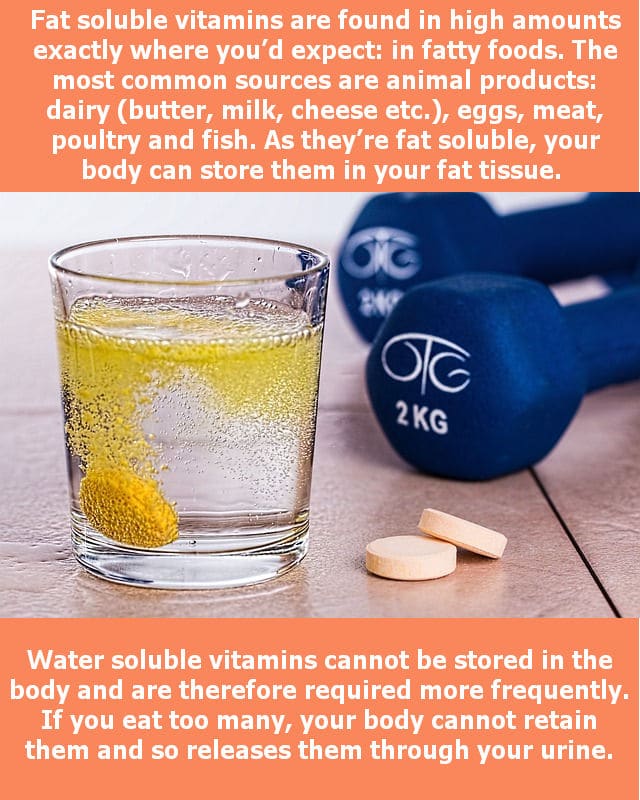Vitamins and Minerals
Vitamins are essential nutrients (or micronutrients) that your body needs in order to function properly and keep sickness at bay. They’re found in every food source but in varying amounts, which is why it’s so important to eat lots of fruits, vegetables and other natural foods.
There are two types of vitamins:
1. Fat Soluble
Fat soluble vitamins are found in high amounts exactly where you’d expect: in fatty foods. The most common sources are animal products: dairy (butter, milk, cheese etc.), eggs, meat, poultry and fish. As they’re fat soluble, your body can store them in your fat tissue. This means that you don’t need to worry about eating these foods everyday if you eat them most of the time. Also, eating too many can be harmful.
Fat soluble vitamins are:
[mk_custom_list style=”f058″ icon_color=”#00c8d7″ margin_bottom=”30″ align=”none”]
- Vitamin A – Important for growth, the immune system and vision
- Vitamin D – An antioxidant used to prevent and treat rickets and help bone health
- Vitamin E – Protects the heart and blood vessels and is used for treating diabetes
- Vitamin K – Used to help blood clots which prevents excessive bleeding
[/mk_custom_list]
Mainly, you can get Vitamin D from the sun so allowing your skin to have enough exposure to sunlight is important. When you wear sunscreen, you block your skin’s ability to absorb micronutrients from sunlight. Though it is good for protecting you from burns, use sunscreen only when it is necessary.
2. Water Soluble
Water soluble vitamins cannot be stored in the body and are therefore required more frequently. If you eat too many, your body cannot retain them and so releases them through your urine. These are not generally considered harmful because of this reason. You can find water soluble vitamins in foods such as fruit, vegetables, potatoes, grains and dairy. As they’re found in water, some of them could be lost when you cook foods – especially when boiling. They can also be destroyed through exposure to heat. For this reason, you should keep heat to a minimum when cooking these foods or eat a combination of raw and cooked foods. Use the water in soups or broths as opposed to throwing it away, or steam or grill them.
Water soluble vitamins are:
[mk_custom_list style=”f058″ icon_color=”#00c8d7″ margin_bottom=”30″ align=”none”]
- Vitamin C – Needed to form collagen, skin, tendons, ligaments, scar tissue and blood vessels as well as maintain cartilage, bone and tooth health
- B Vitamins – There are 8 B vitamins in total (B1, B2, B3, B5, B6, B7 (biotin), B9 (folic acid), B12) and they help convert food into fuel to give our bodies energy. Folic acid is used by the body for producing and maintaining cells as well as preventing damage to your DNA which can lead to cancer
[/mk_custom_list]
Minerals main functions are to help the body build strong bones and teeth, control body fluid and to convert your food into energy. You can find them in meat, fish, dairy, vegetables, fruit and nuts. Some are essential, such as calcium and iron, though all are necessary to make up a healthy and balanced diet.
Most people can get all the nutrients that they need from eating a balanced and diverse diet. However, some people struggle to eat a range of foods or have trouble absorbing micronutrients. This is when supplements can come in handy. Supplements give your diet a nutrient boost to make sure that you’re getting everything that you need. As a rule, it’s best to take a multivitamin just in case. There’s no harm in taking one even if you do eat a balanced diet. It simply makes sure that all your important levels are topped up. Any excess will be excreted and shouldn’t cause any trouble.
If you’re unsure about your levels of some vitamins and minerals, then you can take a blood test.
The Four Principles of Eating
1. Diversity
You should aim to eat 500g of fruit and vegetables each day from a wide range of sources. A good way to make sure that you do this is to pick different colours and mix them up. For example, if you’re having a tomato based sauce, then add yellow peppers, green courgettes, white mushrooms, orange carrots and black olives. The colours of a food are a good way to tell what vitamins and minerals are inside. By eating a range of colours, you’ll also get a range of micronutrients. Also, alternate which foods you eat each day. Need carbs? Alternate between oats, rice, potatoes, sweet potatoes etc. Fats? Nuts, seeds, dairy, meat, oily fish, eggs etc. Protein? Fish, meat, eggs, beans, poultry etc.
2. Moderation
As with anything when it comes to nutrition, you need to practice moderation. Just because something’s healthy for you doesn’t mean that it needs to be eaten in excessive amounts. Let’s look at carrots. They’re great for you in moderation but too many can turn your skin orange. Too many people can go overboard with their diet to the point where it becomes harmful. Practicing moderation is key when it comes to both physical and mental health.
3. Balance
Just as micronutrients (vitamins and minerals) have important functions, so do macronutrients (fats, proteins and carbohydrates). You also need to have a balance of these. First, you need to calculate the total amount of calories needed for each day. You can easily do this by searching for an online calorie calculator. From this you can work out how many of each macronutrient you need per day. I recommend having 10-15% protein, 20-30% fat and 50-60% carbohydrates. Protein and carbohydrates both have 4 calories per gram whereas fat is much higher at 9. If you don’t want to count calories, then you can use the food pyramid and just become a conscious eater. The basics of the food pyramid are that fruit and vegetables should make up the majority of your diet, then carbohydrates such as cereals and potatoes, then meats, fish and dairy, and finally fats such as oils, nuts and seeds.
4. Quality
It’s best to get your foods from fresh organic sources as these retain the most micronutrients. However, if you’re on a tight budget, then you don’t need to worry about spending more money and just concentrate on eating a diverse range of foods.
Now, there are many opinions when it comes to food and diets. Some people will say you need to eat predominantly fats, some will say carbs. There are even those that say you need to eat according to your blood group or the phase of the moon you were born in. Be careful not to overload yourself with information. Some of it has no scientific approval. When it comes down to it, all you need to do is eat in moderation from a wide range of natural foods. Sure, you can eat a little ‘unhealthy’ sometimes, but as long as it doesn’t make up the bulk of your diet, you’ll be fine. Remember, moderation is key.








Leave a Reply